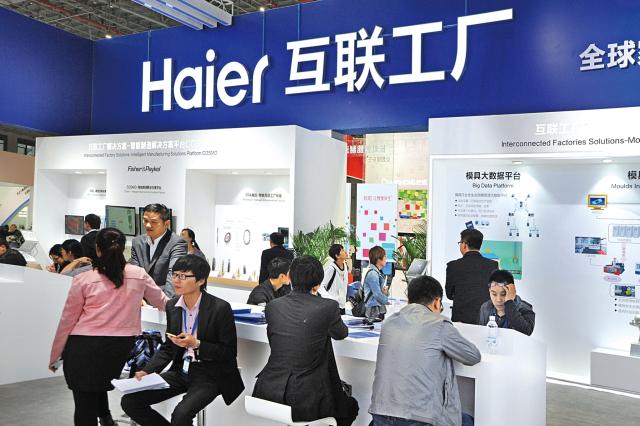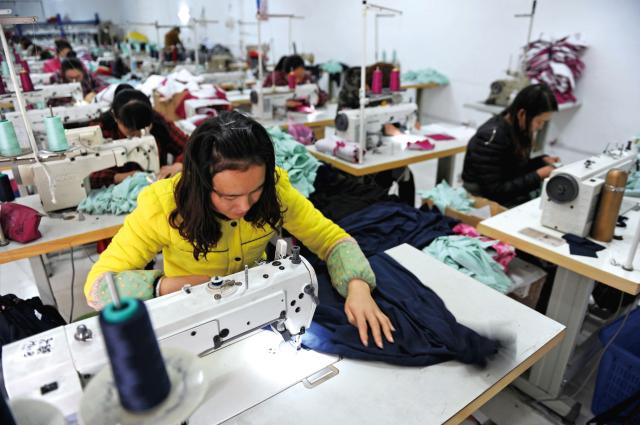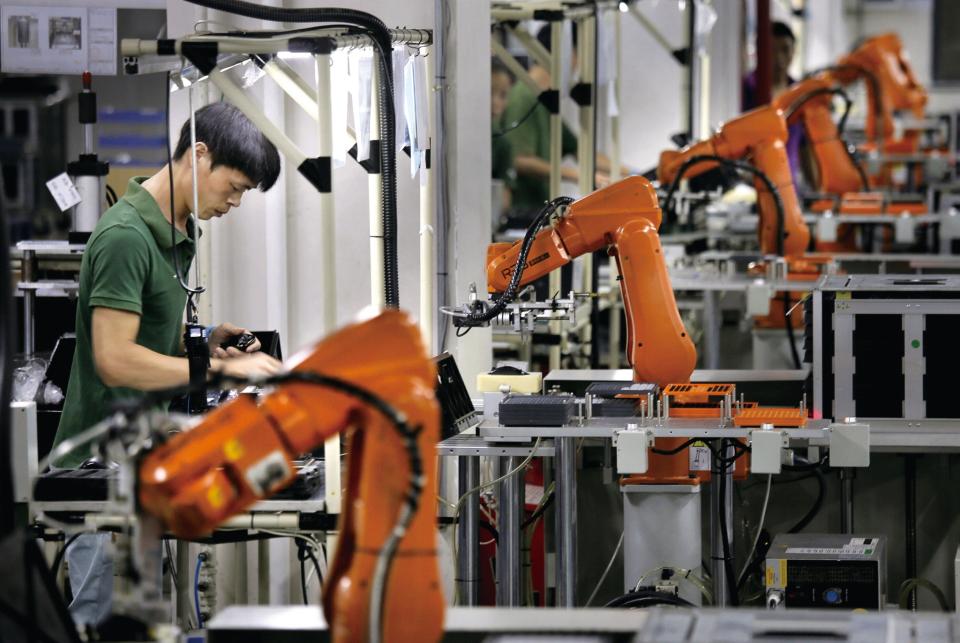China appears to have taken a rougher road than developed economies in its attempt to become an interconnected wonderland of digitized manufacturing, thanks to unique circumstances
In literature, heroes outsmart villains not only with courage and honor, but with superior weaponry, be it the Elder Wand or the One Ring To Rule Them All. In the real world, winners are often the early adopters of the best tools, or those who first turn them to a superior purpose, be it the steam engines of the 18th century, electricity in the late 19th century or computers in the 20th. Now, the world’s major economies have collectively placed their faith in the Internet, with a vision to establishing universal interconnectivity between the real and the virtual.
Termed Cyber-Physical Systems in Germany and Industrial Internet in the US, the manifestation of this vision differs from place to place, and yet such labels indicate convergence on a core idea, the integration of the physical and digital worlds to spark what is being regarded as a fourth industrial revolution.
China is keen to join this venture. In May 2015, Beijing launched the Made in China 2025 strategy. A year later, policymakers set out to achieve this strategy’s stated aims by developing smart manufacturing which, in turn, would be built on the concept of “industry-plus- Internet.” At an industrial Internet conference in Shanghai held May 28, Chen Zhaoxiong, vice minister of China’s Ministry of Industry and Information Technology (MIIT), noted that the integration of industry and the Internet lies at the core of developing smart manufacturing.
At a May 6 press conference on the linkup between manufacturing and the Internet, Xin Guobin, another MIIT vice minister, said China has done well in applying Internet technology to mass consumption through e-commerce platforms, but has so far failed to effectively use such technology to create value along the manufacturing supply chain. Chinese Premier Li Keqiang and other senior officials have repeatedly reiterated that China’s starting point is weaker than its developed competitors, with work still to be done in deploying general automation and IT in manufacturing. This may herald a bumpier road for China in its quest to follow the lead of developed countries and realize the dream of industrial Internet.

A booth run by Haier, a Qingdao-based home appliance giant, at the 17th China International Industry Fair, Shanghai, November 3, 2015

Chinese workers in a garment factory in Huainan, Anhui Province, November 11, 2015
Online Power In China, Internet companies are taking the lead in setting up a preliminary, web-based Industry 4.0, while in Germany and the US, manufacturers have played the leading role, according to one senior manager with a leading Chinese Internet company who spoke to NewsChina on condition of anonymity. His belief is that this disparity in terms of the main driving forces behind the development of the industrial Internet is what separates China from other major industrial economies.
Analysts attribute this to the fast growth of China’s Internet-based consumer market. According to the 2016 edition of the widely read annual Internet Trends report published by Silicon Valley venture capital firm Kleiner Perkins Caufield & Byers, China has outperformed the US in several metrics relating to Internet services, including advertising, commerce, travel and finance. For example, retail revenue generated through the Internet accounted for a bigger share of total retail revenue in China than in the US from 2012 to 2015.
Denis Depoux, Asia deputy president of Germany-based consultancy Roland Berger, told NewsChina that online retail accounted for a much smaller market share in Europe than in China. He added that the massive volume of online purchasing in China could provide data to help suppliers anywhere in the world understand and respond quickly and more efficiently to the specific demands of Chinese consumers.
Consequently, he hopes that European manufacturers will also benefit from mass online consumption in China.
Chinese manufacturers have also responded to the e-commerce boom. Through a platform launched by Alibaba at the end of 2013, a clothing retailer on Alibaba’s online retail outlet, Taobao, is able to search for a factory in China that can deliver T-shirts printed with popular South Korean or European designs within a period of time determined by the seller. That same factory can offer the same customized service to numerous potential customers at any time, organizing its production lines accordingly.
Although heavy machinery manufacturers are comparative latecomers to the digitization party, they are among the most enthusiastic.
“For the next generation, engineering equipment might become a tool of the Internet just like cell phones and computers,” said Tang Xiuguo, CEO of Hunan-based heavy plant manufacturer Sany Group, which is currently expanding in Europe, the US and Africa, at a May 15 forum sponsored by the think tank Center for China and Globalization. Tang added that the Internet could help his company to precisely locate equipment and predict potential faults for its customers. A survey conducted at the end of 2015 by Fourth Industrial Revolution, an Industry 4.0 consultancy for Chinese enterprises, shows that many Chinese enterprises have begun to become aware of how useful the Internet and Big Data are in facilitating direct communication with consumers.
The Internet company executive we spoke to believes that a wellconnected, user-oriented supply chain catering to highly customized, diversified and fast-changing demands is what the industrial Internet project is all about. Only if engineers and managers of factories already well-acquainted with mass production methods can adapt to organizing around the demands of various end users – a mindset he says is “in the genes” of Internet companies – can the industrial Internet revolution reach its full potential, he said.

An outlet of Shangpin Furniture, a company using Big Data technology to provide custom-built furniture for consumers, Guangzhou, Guangdong Province, October 29, 2014
Offline Gap
China’s strength online, however, does not guarantee a victory in the race to establish Industry 4.0 through aggressive leveraging of industrial Internet. Chinese analysts have warned that industrial enterprises need to make up for lost time if they are to successfully adopt Internet technology to upgrade their business. In this particular race, China has found itself lagging behind several developed countries, with many sectors still struggling to fully implement the changes wrought by the world’s first three industrial revolutions. As Chinese officials have repeatedly stressed, the country needs to install automated and digitized production on a massive scale, whereas industrialized countries already have most of the necessary systems in place. The 2015 survey by Fourth Industrial Revolution also indicated that Chinese enterprises are investing mostly in automation and supply chain management software and services, a pragmatic choice, but hardly cutting-edge.
Although it will take time for Chinese manufacturers to truly upgrade their production lines, there are no technical barriers to such an undertaking, which will be buoyed by widespread enthusiasm. Management philosophy is probably a more problematic offline issue that is holding China back. The 2015 Fourth Industrial Revolution survey found that customized production is not a significant priority for most Chinese enterprises.
A man surnamed Mr Jin, who owns a business that sells bespoke suits to middle-class Chinese and US clients, had originally planned to renovate an old clothing factory and turn it into one befitting a custom tailor, but later decided to build a new one from scratch. In his factory, each of the more than 100 steps involved in making a suit can be adapted according to customer preference. As he told NewsChina, many managers and executives in the textile industry, especially those operating according to ties of kinship and dependent on orders from overseas brands, are reluctant to endure the pain of reinventing their business model, despite a lack of technical barriers.
All Industry 4.0 plans set out by Germany, the US and China demand that web-based networks include not only a vertical supply chain (connecting raw materials to end users), but a horizontal one that links suppliers at the same stage of production. This means that a manufacturer will provide production and service resources for end users that can be accessed not only by the manufacturer itself, but also by other players along the whole supply chain, even its competitors. Taking either of the above two steps will be painful. The Industrial Internet Insights Report for 2015, a survey conducted by General Electric and Accenture in China, France, South Africa, Germany, India, the UK and the US found that the biggest challenge for companies’ Big Data strategies is the “data silo,” or barriers that prevent information sharing between different departments within a company. Chinese analysts are also concerned that data exchange at the social level among companies could prove even less successful in China than in developed countries, given the poor record most Chinese companies have in terms of corporate integrity and credibility.
In a June 1 article for the Economic Daily, Liu Xingguo, a researcher with the China Enterprise Confederation, commented that many small- and medium-sized Chinese enterprises (SMEs) pay more attention to taking advantage of legal loopholes in the pursuit of quick profits than they do to competitiveness. Besides systematic discrimination against private SMEs, he noted, such companies generally do not care much about the quality of their product. This, he concluded, is why Chinese companies generally have a shorter lifespan than their counterparts in developed economies. Jin said that without a reputation for dependably good quality, pushing either smart manufacturing or an industrial Internet makes little sense. Internet giants themselves are far from perfect. E-commerce platforms have long been criticized for fake and shoddy products, data fraud and unfair practices.
Industry insiders agree that smart manufacturing is not just about adding the Internet to the existing system. The wrong medication “won’t cure one’s illness,” commented Zhu Hai, president of Schneider Electric China, writing in an April 25 article for People’s Daily. Zhu explained that enterprises have to “see the doctor,” get a diagnosis of their existing production and management problems, and then consider rolling out smart manufacturing.
A good relationship is usually formed by partners who are honest with each other, share similar values and support one another in times of crisis. In these crucial regards, China’s on- and offline enterprises have a long way to go, and their “magic weapons” will only be effective if they are wielded with strength and wisdom.

 Old Version
Old Version


